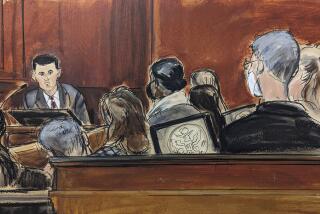Doubt Cast on Expert’s Views in Keating Trial : Testimony: A UCLA professor says the bonds sold to small investors paid little, but he concedes under questioning that he didn’t make comparisons.
- Share via
LOS ANGELES — Payments to small investors on their American Continental Corp. bonds were “woefully inadequate” compared to what sophisticated investors received from the company’s other bond issues, an expert witness testified Tuesday in the criminal fraud trial of Charles H. Keating Jr.
The bonds sold through the company’s Lincoln Savings & Loan branches were the lowest-ranking of three bond issues, standing last in line to be repaid in case the company went bankrupt, Alfred E. Hofflander, a professor at UCLA’s Graduate School of Management, told a Los Angeles County Superior Court jury.
While the yields on the Phoenix company’s lowest-ranking bonds ranged from 9.5% to 12%, the returns should have been in a range of 13.5% to 29.8%, based on what the more senior bonds were paying, Hofflander said.
But under cross-examination, he admitted that he didn’t recall that the senior bond issues were never traded publicly, and, thus, had never established a rate of return dictated by the market, putting in doubt a true comparison of yields.
He also acknowledged that he didn’t compare the yield with those of similar bonds issued by other companies. A sampling of such comparisons presented in court by the defense showed that American Continental paid returns as high or higher than other companies.
His study of American Continental bonds also did not consider the impact on the bonds of such matters as the October, 1987, stock market crash or the faltering Arizona real estate market, where much of Irvine-based Lincoln’s deposits were invested.
Keating, American Continental’s former chairman, is accused in 20 counts of defrauding 22 small investors out of $1.8 million through false statements and omissions of material information in the sale of his company’s bonds.
The investors are part of thousands of bondholders who lost more than $250 million after the Lincoln and the Phoenix company collapsed in April, 1989. Lincoln is the biggest thrift failure to date, with a cost to taxpayers of $2.6 billion.
Keating, 67, denies the charges and counters that he used the best legal and accounting help available to structure the bond-sale program. He has argued that investors would have been paid off had federal thrift regulators not caused the financial crisis that led to the downfall of his unconventional thrift and real estate development company.
Hofflander, the prosecution’s primary expert witness on the bonds, generally educated the jury on some of the aspects of corporate financing through bond issues. He splits his time between teaching corporate financial management at UCLA and conducting research on insurance industry topics.
His study of American Continental bonds was based on the prospectuses that accompanied three separate classes of bonds, as well as on documents filed with the Securities and Exchange Commission.
Senior notes and senior subordinated notes were sold by brokers through investment bankers to generally sophisticated investors. So-called subordinated debentures--the last in line to be paid in the event of a company’s failure--were sold by the company directly to mostly elderly, unsophisticated individuals who were typically Lincoln customers.
“Those people don’t have the expertise to understand what’s in those prospectuses,” said Hofflander, who termed the investments junk bonds. “Those people shouldn’t have bought the bonds.”
But he also said that there appeared to be nothing illegal about selling any of the bonds and that the only way bonds could be sold is with a prospectus.
More to Read
Inside the business of entertainment
The Wide Shot brings you news, analysis and insights on everything from streaming wars to production — and what it all means for the future.
You may occasionally receive promotional content from the Los Angeles Times.









